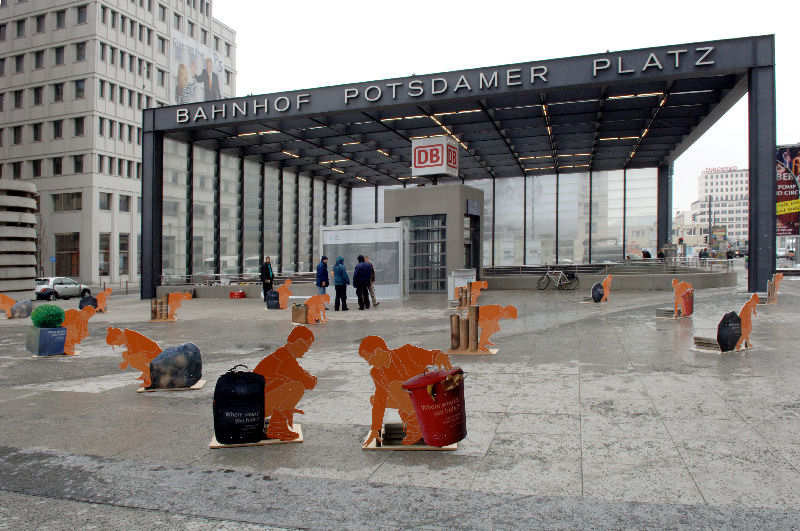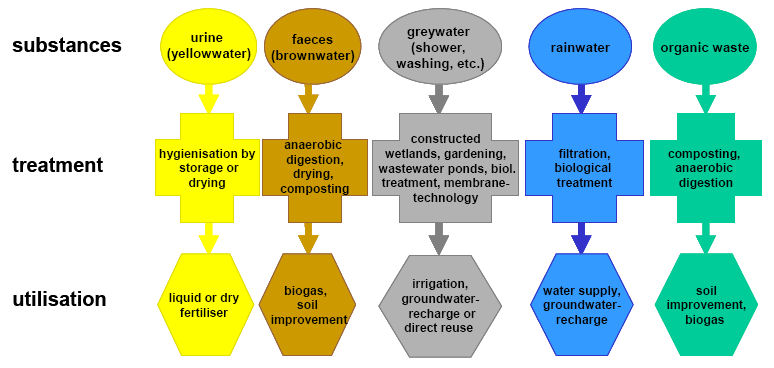 The german print media recently covered the interesting initial public start of an international organization – the German Toilet Organization (GTO) – here in Germany which main objective is to lobby for more (public) toilets and improve access to clean sanitary needs worldwide (the pic to the left shows the recent “sanitation is dignity” exhibition on Potsdamer Platz in Berlin, Germany as organized by the GTO – pls click to enlarge).
The german print media recently covered the interesting initial public start of an international organization – the German Toilet Organization (GTO) – here in Germany which main objective is to lobby for more (public) toilets and improve access to clean sanitary needs worldwide (the pic to the left shows the recent “sanitation is dignity” exhibition on Potsdamer Platz in Berlin, Germany as organized by the GTO – pls click to enlarge).
Toilets, choo, restrooms, latrine, lavatory – you name it.
Well, you name it? What kind of words do people use when they try to express their need to “take a natures call” or have to relieve themselves? The problem starts with the fact that we – we as in people world-wide – don’t even like to talk about these issues. It’s a taboo that keeps on being ignored, yet going to toilet is just as natural as eating or sleeping. And in order to improve the sanitary situation worldwide, first thing we need to do is to start talking about this issue.
The shocking truth is that, according to the WHO and UNICEF, roughly 2,6 billion people (around 42% of the worlds population) don’t have access to a working (read: adequate) sanitary system – and with an ever growing population and a clear need for an improvement, something has to be done. Soon.
“Proper sanitation protects water resources, increases health, provides dignity, increases agricultural production, can be an energy resource”….wait! It increases agricultural production? How come?
The problem with waste water treatment in huge treatment plants starts with the initial problem that we – the users – flush down virtually anything down the toilet. Out of sight, out of mind? Maybe… However, the results of these daily actions are that we get to have this huge mixture of waste and nutrients that require a lot of process engineering and energy to be separated.
==> We are using electrical energy to treat our waste. How crazy is that?
Now, what’s with that argument that an improved treatment could increase agricultural production? Let me please (try to) explain:
Instead of re-thinking complicated and expensive ways on how to separate this horrible mixture, let’s directly go to the root of the problem and separate the urine from faeces and greywater where they are being mixed up: at the toilet. There are some toilet designs out there that come with a built-in separation system – just think of a bowl that has an extra outlet for the urine and you get the idea.
By doing this, we receive an almost homogeneous, separated material out of which we can then recover nutrients, trace elements and even energy. Think of phosphor, this fertiliser stuff we put on our fields & gardens: the world-wide resources are limited, yet some countries (like Nepal) still invest a lot of money to import it although we could just recover up to ~40% of that phosphour from our urine.
In fact, the German Agency for Technical Co-operation (GTZ) started (among others) an initiative to promote this idea of closing nutrient loops some years ago and have shown great progress in promoting this much needed approach to fulfill the Millenium Development Goals set by the UN. They call it ecological sanitation (ecosan) and to emphasize a systematical approach to this paradigm shift, they have published a source-book (PDF, 9 MB) as well as other useful information material that will help to promote this great idea of ecological sanitation.
Mind you – ecosan isn’t just a technology or a technical approach to bugging issues. It’s a philosophy and understanding for the challenge which we’ll have to face in the 21st century: closing biological cycles/loops. Among the key issues of ecosan as documented in the so-called Bellagio Principles, we find the following definition:
Waste should be considered a resource, and its management should be holistic and form part of integrated water resources, nutrient flow and waste management.
• inputs should be reduced so as to promote efficiency and water and environmental security
• exports of waste should be minimised to promote efficiency and reduce the spread of pollution
• wastewater should be recycled and added to the water budget
And yes, I am very passionate about this subject and as I’ve mentioned earlier, the challenge I see for us in the 21st century will be to re-design the products and technologies we’re using on a daily basis so that every material remains in a biological or technical loop / cycle. No more end-of-pipe technologies but cradle-to-cradle designs with materials that remain as nutrients to future generations. There is so much technology out there and it starts with generating an awareness for the biological cylce – something our forefathers already knew and we apparently forgot with todays products. Also, this isn’t just one of those ideas for the drawers of development aid – this is an approach on a global basis that sees various implementations in e.g. Europe as well as in Asia or Africa. The technology is already applied – even in Kenya – and in fact, I am planing to promote this even more when I am back in Kenya.
(@GTZ: I AM YOUR MAN ON THIS…hint, hint ;-)
Coming back to the toilet issue, please have a look at the website of the World Toilet Organization to find out what YOUR options are to make a change – now. Thank you!


Hi, I am also passionate about the ecosan issue and would like to get in touch with whoever gave a commentary on the whole sanitation issue.
Thanks
Julie
Kenya